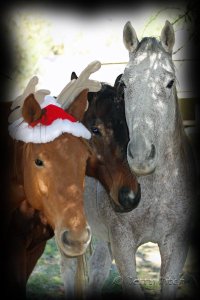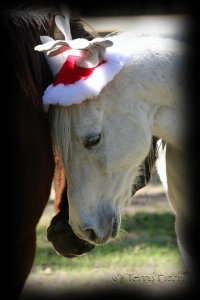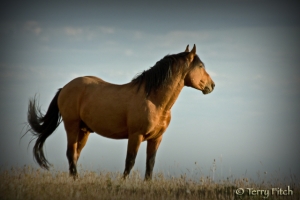Straight from the Horse's Heart
“Today is the last ‘Feel Good Sunday’ before Christmas 2014; a magical day indeed, and for me the day bears great significance as I am home and will remain here over the holidays as it has been several years since we have experienced such a luxury. With that said, I have resumed my duties of making dinner for the boys in the barn and feel the warmth that their souls and spirits bring to our lives. Being that I am still suffering jet lag I have not sat and contemplated their essence but still they have managed to brush a few cobwebs away from my aging brain. And today, we share with you a story that I wrote some years ago after spending a special evening in our former barn with the same souls, with some sadly departed, that bring us joy today. You can take this tale with a grain of salt or you may kindly grant me a little bit of literary license but none the less, our equine companions have a story to tell if only we will slow down and shut up long enough to listen. Enjoy this day my most special and valued friends. Keep the faith.” ~ R.T.

Pele, Bart and Harley ~ photo by Terry Fitch
It was like any other evening feeding of the horses, yet it was not; or not quite, as something was different. The air was crisp and cool as Christmas was only a week away in South Louisiana, but the feeling had little to do with temperature or barometric pressure. There was an electric buzz in the air; the feeling of white noise just outside the audible range of the human ear. There was something tangible and moving in the barn that night.
I did not pick up on it at first. Terry, my wife, was off having an early Christmas with her family in Florida, which means that the barn chores and the feeding of all our four-legged children rests upon me when I return home from my office in the evening. And, at this time of year, it is already dark. It’s a matter of rushing home, putting the vehicle up for the night, greeting and playing with Kenny, the white German Shepherd who is so excited to see you that he bounces three feet high, dashing into the house to turn on lights, checking messages, changing clothes, feeding the cat; then back outside to dribble the bouncing dog; and into the barn to cook dinner for the equine boys. Oops, I missed that while in the house I might fix an industrial strength Wrangler Iced Tea to take out to the barn with me, not a requirement, but a nice reward for all the running around.
I scurried into the tack room, flipped on all of the lights and turned up the radio as Christmas music was the order of the day. As I carefully measured varied degrees of hoof supplement and rice bran with their normal pelletized feed, the thought crossed my mind that my parents, especially my mother, never had the opportunity to see our equine kids nor experience this very special side to our otherwise very busy lives. I paused from humming along with the radio and reflected on what a tremendous loss that was. I resumed mixing and humming with a small pang of sadness in my heart.
I went from stall to stall filling up the appropriate feed bins with the proper amount of food. Each time I exited a stall and went back to the tack room I asked Kenny how he was doing; he sat so attentively out in the driveway. This simply inquiry would start the bouncing, again. I’ll never figure out how a 100 lb dog could bounce so high and he made me laugh. I was just about finished with the mix of the last meal when the traditional and expected three measured knocks came to the back door. Terry and I have learned to keep the back “horse” door closed until ready to let the horses in as it is such a pleasure to hear those three distinct and perfectly timed and executed knocks.
We know who it is and he does such a good job at it. It’s Ethan. He is the King of Knocking, the Guardian of the Food Gate, and the funniest of them all at feeding time. ,
I hollered back through the closed doors that I was hurrying and would be right with him. With that, I dumped the last bucket of feed in Apache’s stall, walked to the back, and carefully cracked the sliding doors. Who was standing with his head pressed to the middle of the doors, Ethan, as always.
“Are you ready?” I asked and a part of me picked up on a gentle nod and smile.
The doors were slid open, the breezy gate was swung out and, as they do every night, they came in the barn in perfect order to eat the dinner that I had labored over in preparation for them.
First came Ethan, then Harley followed by Apache and bringing up the rear is the biggest, the youngest and the most fearful, Bart. He feels more comfortable when they are all tucked away in their stalls with their doors closed so that no one can stick their head out and attempt to bite him as he walks down the aisle. He actually stops and looks into each one of their stalls and you can almost hear him say, “Ha, Ha, you can’t get me now”. Hopefully, one day, he will grow up.
Immediately the barn was full of the sound of relaxed munching and filled with the sweet odor of horses and feed. I looked back at Kenny who only bounced two feet instead of three feet off the pavement hoping that I might sit down and enjoy this moment. I went into the tack room to pull out a chair and sit in the center aisle of the barn to commune with the horses. My Brazilian hammock, however, caught my eye.
“Ah ha” I cried and snatched up the hammock with one hand while I grabbed the “tea” in the other. This could be good!
Two quick slips of “S” hooks into the installed tie rings on to opposing stalls and I had the hammock swinging across the center aisle in a heartbeat. Kenny lay down, as I eased into the hammock, because he knew that this could be awhile. I sat down with my back propped up and began to swing while singing along with the Christmas music from the radio.
It did not take long to realize that my singing was not appreciated. Bart began to pound on the stall wall with his right front hoof and Apache quit eating to urinate, on the clean shavings in the stall, in protest of my singing. I actually was not too offended by Bart’s signal to quit but for Apache to pee in his stall was pushing the envelope a little too far. I felt rather hurt so I just shut up, set my drink down on the aisle floor and listened to the sounds of the horses mixed with the sound of Christmas.
The music stirred emotions from seasons long past: seasons of happiness, hope, disappointment and most recently, pain. But I am the Captain of my ship and I had no intention to sail into dark and murky waters this night. I simply wanted to let go and feel the companionship of my friends around me. That’s when I heard the buzz.
At first I thought that the radio was slipping off from its frequency but the music was still there, clearly playing. The buzz was overriding the music; the “white noise” was multidimensional and not strictly coming from the tack room. I did not make a serious attempt to think about it as the sounds and smells were like candy to my senses and the buzz was only the canvas that the painting of the moment was applied to. I relaxed.
I closed my eyes and continued to rock back and forth. There was a feeling of warmth in the barn, while all of those equine souls were inside eating and enjoying. The buzz, on the other hand, continued to grow. In the beginning it really was not something that I was paying much attention to but now I attempted to tune into where it was coming from and what it was. I continued to rock. I could still hear the horses and the music but now the buzz was growing in volume. As I continued to mentally identify its source, it was becoming ever more evident that the sound, itself, was coming from within. It was coming from inside of my head and not related to anything outside of myself. I was aware that I was humming “Away in the Manger”, along with the radio but it was becoming evident that the white noise was music also. In that music there were whispers, words, phrases and thoughts being conveyed. Without knowing it I gave in to the music from within and opened up to the whispers and words. There were many voices with varied depths and pitches although different they all blended together in song and, it was soul stirring. I listened and listened and listened until I finally made out the words that were being sung to me. It came as abruptly and as clearly to me as if a sonic boom had just resonated throughout the barn. In thousands of voices, from deep within my soul, the words being sung in perfect harmony were “We were there!”
I stopped rocking and the singing stopped; there was total silence. My eyes popped open and I was looking straight up. Once they focused I could see two small sparrows in the barn’s rafters looking straight down at me. They were looking directly at me with calm assuredness. The radio was silent, only my breathing could be heard. I sat up and looked at the stalls; all of the horses were looking directly at me, calmly, with their heads bowed. I then gazed out across the moonlit pasture and could see the little donkey and her herd of cows staring directly into the lighted barn. Not one of them was moving. I quickly swung around and looked out the other door for Kenny; he was laying calmly with his head between his paws and his big brown eyes starring right at me.
I went to stand and in the silence the words came again, “We were there!” I froze.
“We were there that night”, the collective voices continued.
“Wait, what, who?” I started to ask.
“Just listen and absorb. Do not ask, we will tell.” the voice said. “We were there in the stable, that night. All of us in one shape or form. We were there long before human shepherds and nobles came to see. We were there to see him take his first breath. We were there.”
“It is important, at this time, for you to know that we were the selected witnesses, the guardians and the companions of the Son of the Light. You need to understand that we are closer to the source of goodness and purity than all mankind. You need to know that your fight for our lives is a just and noble one. All of you humans who guard and protect us walk in a very special light. You have now been there too; now you know and now you must continue the fight”, the voice ended.
“Wait! What do you mean I was there too?” I called. I stood up and turned around because I did not know who I was talking to. I looked at the horses, the dog, the birds, the donkey, and the cattle. ”What do you mean?”
Reality had yet to come to me as I stared into the horses’ eyes.
Again, the voice returned, “You were there, too. When you opened your eyes, just a few moments ago, what did you see first?” it asked.
I stammered for a second and came up with, “The birds; the birds in the barn’s rafters.”
The voice asked, “What did you see next?”
“Well, I saw the horses looking at me from their stalls, the donkey, the cows and Kenny the bouncing dog, all looking at me.”
“Yes”, the voice said, “And what were the first impressions in the life of the Gifted One when he first opened up his eyes in that stable long, long, long ago”?
“I would imagine that when he first opened his eyes, lying in a manager, he saw the rafters in the barn ceiling with the birds looking down…” I stopped talking so quickly that I almost bit my tongue. There was a warm sensation washing over me and it was more than just the tie-in and realization of what had just occurred.
I could not speak and was about to sit back down when the voice added;
“Yes, you see now. You have been there too. We all have been there yet, few humans can remember. This is our gift to you. Carry the light and chase the darkness; we love all of you for what you do.”
Hearing those words, there was something else, I could not then nor can I now describe it. Perhaps a sigh, perhaps it was a catch as if emotion had welled up but there was something there, not spoken, that touched me more than the words.
In a dreamlike state of numbness I began the process of releasing the horses from their stalls to their pasture; this is done in the exact reverse of the entry process. I moved like a robot as the power of the words and the moment were still within me. I opened up Ethan’s stall and he walked out and stood in the middle of the back door as he often does.
Harley was next. I stood at his stall door and allowed my hand to move down his furry side as he calmly walked by me and out past Ethan.
Apache usually flattens his ears when he sees Ethan in the doorway and chases him out; but not tonight. When I opened up his stall he calmly walked past us both without any notice.
Finally, Bart was freed to return to the beloved round bale and as he exited I asked him to stop and I gave him a hug. He gently kissed my bald spot and headed out past Ethan.
I then turned my attention to Ethan; I stood next to him in the doorway and gazed out upon what he was viewing. The donkey and cows had gone back to grazing in the moonlight and the neighbor’s horses were tucked away in their barn with their heads hanging out. Our three were all drinking from the trough, together, and the sky was fantastic with the moon and stars. It was picture postcard perfect.
As he stood next to me I put my hand on Ethan’s withers. He turned to me and put his left nostril right against my heart which placed his left eye at the same level with mine. I said, “Merry Christmas, my friend.” He blinked, turned and then stepped out into the night. As I watched that big Appaloosa butt dwindle from the light of the barn he stopped and turned. Regardless of what anyone says, he had the biggest smile on his face that any horse could have.
I lowered my head, pulled my glasses off to wipe the tears off the lenses, closed the back door, walked past the still full glass of tea sitting on the floor under the hammock, turned off the lights, walked out of the barn and stood over Kenny who had still not budged.
“Want to go inside, boy?”, I asked.
He bounced five feet high this time and we happily dribbled each other up the driveway to the house like we were two ten year old kids headed for a game of basketball.
The moon cast shadows of us dancing on our way as the horses continued to hum in the pasture,
“We were there”.











